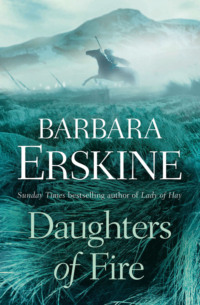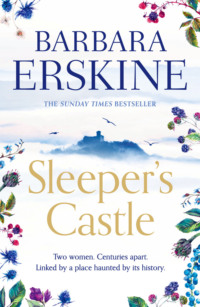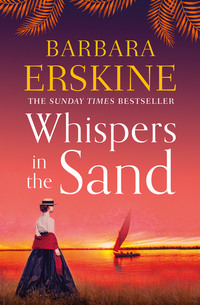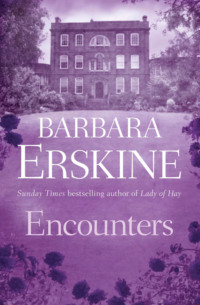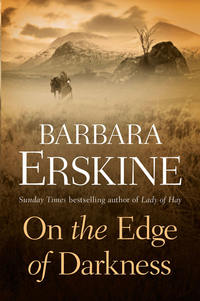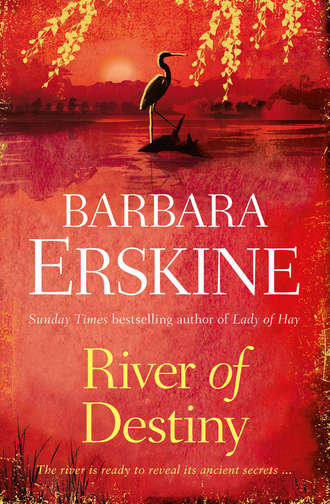
Полная версия
River of Destiny
She walked across to the window and stared out. ‘I can’t live my whole life afraid.’
‘It strikes me that you would be afraid of very little,’ he said thoughtfully.
She grimaced. ‘But then you don’t know me very well. Perhaps afraid is the wrong word. In a rut, then. London was comfortable and safe.’
‘And sailing isn’t safe.’
‘We sailed before.’ She hunched her shoulders defiantly. ‘It was fine. It is fine.’
In the distance the river water was dull, sluggish, creeping in, creeping up between the banks. She could feel the cold tiptoe across her shoulders and deliberately fought the reflexive shiver. The kitchen was warm.
‘It was partly because of his enthusiasm that we came here, of course it was. Our life together has always been like that. He’s the match, and I smoulder into flame.’ She broke off and it was a moment before she laughed. ‘But this time the flame hasn’t caught. Or not the way I expected. I thought I would like it here. I did – do – love it here. But something is wrong.’ Why was she confiding in him like this?
‘Does Ken know how you feel about all this?’ he said after a long pause. He had been watching her while she spoke.
She nodded.
How could she explain the complexity of their relationship? It was Ken’s enthusiasm, his drive, his passion which attracted her, his wiry single-mindedness. But it was that same single-mindedness which excluded her, blanked the parts of her personality which did not fit his template. Once she had thought she could change him, but the change, if there was to be change, would have to be hers, and that admission, that she had judged him wrongly, and that she must change herself or be for ever sidelined had been too hard to make.
‘You love the river,’ she said, turning back to face Leo.
‘Yes.’
‘And you love sailing.’
He nodded.
‘Are you never afraid?’
‘Everyone is afraid sometimes, Zoë.’
‘Yes, but in Ken’s case he’s hooked on the adrenaline. He’s competitive. He is always testing himself against something. Fear excites him.’
He made no comment and she turned back to the window. ‘Ironically it was the river that drew me to this house. It fascinates me. But now we are here for some strange reason it –’ she hunted for the right word – ‘it repels me as well. I find it as sinister as it is beautiful.’
‘I saw you sketching it.’
She glanced at him, startled. ‘When?’
‘You were down on the boat.’
She shook her head. ‘I can’t draw. I can’t do anything. I was trying to find something to occupy me while he tinkers with the boat. Sketching will not be it.’
‘I’m sure you will find something.’ He grinned. ‘Do you have to go down on the boat to keep him company?’
‘I don’t think he even notices I’m there half the time.’
‘There you are then. You need a land-based hobby.’
‘I jog, but that is hardly a hobby. Not for me, anyway. I need to sort out my life, my relationship, my whole raison d’être.’ She shrugged. ‘No. Forget I said that. That is part of something I have to sort with Ken.’
He gave a half-nod. ‘Fair enough. It’s forgotten.’ He stood up. ‘My five minutes is up. Just keep a wary eye out for the kids from hell, OK?’
She gave a faint smile. ‘So, apart from your mate, Jade, how many did you say there are?’
‘Three boys. Darren, Jamie and Jackson. Jackson doesn’t feature much, thank goodness,’ he grinned. ‘He’s left school and is for all I know collecting ASBOs; I doubt he has any other qualifications. Which is a shame. Jeff and Sharon are decent people, chaotic and noisy and sometimes irritating to a grumpy codger like me, but still salt of the earth.’
Zoë put her head on one side. ‘In my experience when people are described as salt of the earth it usually means they are just the opposite.’
‘Then your experience is unfortunate. I meant it.’ His voice had hardened.
‘Sorry.’ She felt a surge of irritation at the rebuke. ‘So, the two I have to watch out for are Darren and Jamie.’
‘That’s right.’
‘Thanks for the warning.’
‘Just being neighbourly.’ He headed towards the door.
She stayed where she was, watching as he walked past the window and across the grass towards his house.
‘Was that our new neighbour?’ Ken had appeared in the doorway and she turned with a start.
‘Why didn’t you come and say hello?’
‘He seemed to be in a hurry. What a dreadful state his face is in. Why on earth doesn’t he get it fixed?’
‘Money.’ She reached for her car keys off the counter. ‘I was going to pick up some stuff in Woodbridge. Do you want to come?’
He shook his head. ‘I thought I would go down to the Lady for an hour or two. Unless you want me for anything else?’
‘No.’ She managed to restrain the sigh. ‘Do you want lunch later or shall I leave you to do your own thing when you come in?’
‘Why not do that? I lose track of time a bit down there.’ He gave her his boyish smile.
She smiled back. Don’t you just, she thought.
She hadn’t planned on visiting the library after the supermarket but suddenly it seemed a good idea. She found her way to the local history section and located one book which looked as if it might enlighten her about the area. She thumbed through the index, looking for Timperton Hall, smiling as she rooted around in her bag for a pen and paper. Did people, she wondered, always start a ghost hunt like this?
In the event there wasn’t much information to be had. The Hall had Tudor origins but had burned down and been rebuilt in the late seventeenth century by the Crosby family, who had lived there for nearly two hundred years. Nearby was the home farm. There was no village as such, apart from the site of an early church which had long since disappeared. That suggested that at some point there had been at least some sort of hamlet in the area. Now there was nothing to suggest that – apart from the barns, which clearly had been part of the estate – there had ever been any kind of settlement on the edge of the river nearby. The nearest church now was St Edmund’s at Hanley Heath, two miles away, and it was there, apparently, that the last members of the Crosby family, which died out in 1873, were buried.
Zoë leaned back thoughtfully against the bookshelves. A small country estate with no particular history. A microcosm of English history. She smiled. Rosemary had made friends with someone who lived in the Hall and had offered to take her up there. It would be nice to go inside, but she suspected that, as had happened with the barns, most traces of its previous history would have been eradicated by the developers. How sad.
She glanced down at a map of the estate at the end of the book, which showed the cluster of barns, the tracks through the woods, an old landing stage, several small houses, which she hadn’t noticed and were probably long gone, and found herself wondering whether she would ever begin to feel at home there.
Putting down roots was a mysterious business which had never happened to her. Her parents had moved often when she was a child and she felt that at base she had never really called anywhere home. She stared unseeing at the map. She had gone from boarding school to Durham University to read English and had then found a job in London where she had shared various flats with a motley selection of people until she and Ken had married ten years before. They had moved twice, both times within a fairly small area, always aware that they would move again. This launch into the country was a change of pattern, an uneasy step, as she had told Leo, out of her comfort zone. Once she had got used to the idea it had seemed exciting and a bit zany. Her friends thought they were stark staring mad, and she had laughed at them, jeering at their lack of sense of adventure, but now she was beginning to realise they were right. She and Ken didn’t fit. No one in the barn complex fitted. They weren’t local. They didn’t belong. They had all been plonked as though from outer space into a pretty piece of countryside and the safety net had been whisked away. And the real locals, the real inhabitants, be they alive or long dead, resented them. Especially the long dead. She looked up, mulling over the disturbing thought. They were still there, still doing their thing as though nothing had changed. And they resented the newcomers bitterly.
‘Excuse me, we’re closing in five minutes.’ The librarian was standing beside her with an apologetic smile. Deep in her reverie Zoë hadn’t noticed her.
She glanced at her watch. ‘I was dreaming. I had no idea I had been here so long.’ Flustered, she pushed the book back onto its space and tucked her notes into her bag then she went to find a coffee shop. She already had a favourite. Surely that meant something.
Lesley Inworth had the ground-floor flat on the right-hand side of the front door of Timperton Hall. She led Zoë and Rosemary into the sitting room and gestured round. ‘Isn’t it a lovely room? I think it’s the nicest in the house. We have this marvellous view down across the river in the distance. The rest of the flat is small. It’s been divided so everybody gets one or two nice rooms and then one or two of the smaller ones at the back. My bedroom was the squire’s study. The stables have been turned into another flat at the back and there are two more upstairs.’ She was a wispy woman, thin and wiry, in her late forties, widowed, according to Rosemary, who had given Zoë a quick update on her background as they walked up the hill, with two daughters who both lived in London. Her passion was gardening and she was employed by the residents’ committee to supervise the grounds and to look after the Victorian gardens, which had miraculously survived and which were very beautiful.
Zoë had been wrong about the Hall losing its character. It had been converted with great care to conserve its architecture and make use of its features. They sat down round the fire, which burned in a beautiful Regency fireplace, while Lesley poured coffee and produced some homemade cake.
‘The history of the house was very sad at the end,’ she said in answer to Zoë’s query. ‘The Crosby family had lived here for generations, then the last squire had no children so the estate passed to some distant cousin who never actually came here. Then his son was killed in the First World War and there was no one else. It was sold up. I expect that happened to so many families.’
‘And after that it was converted into flats?’
Lesley shook her head. ‘It was sold to the farm. Bill Turtill’s dad or granddad. It is an extraordinary turnaround of fate. The Turtills were farm managers to the estate in the nineteenth century, but somehow they ended up buying the farm and a lot of the land, then in the fifties they bought the Hall and the rest of the estate for a song. They showed themselves to be pretty astute. They resold the Hall and kept the land and the barns; then much later they sold the barns for development. They had trouble getting planning permission because they were so old and listed but they managed it in the end.’
‘And so, here we all are.’ Rosemary beamed at them both. ‘And it’s Bill I need to talk to again about the footpaths. He has closed one of them off; changed its route completely.’
Lesley gave her a close look. ‘I hardly think the route matters in the great scheme of things. As long as people can still walk the fields.’
‘Ah, but there you are wrong.’ Rosemary set down her cup purposefully and sat forward on the edge of her chair. ‘These are ancient highways, rights of way. They have to be protected.’
Lesley sighed. ‘My dear, that path you keep going on about, across Dead Man’s Field, it doesn’t exist. I have looked at all sorts of maps and plans. It’s just not there. And there is a lovely walk along a pretty lane down the edge of the field.’ She glanced at Zoë. ‘Has Rosemary signed you up to her footpath mafia yet?’
Zoë shook her head, embarrassed. ‘No, not me. I jog. I don’t like walking. At least not with lots of people.’
‘No more do I.’ Lesley gave a sudden snort of laughter. ‘Ghastly thought! I am sorry, Rosemary dear, but you know it’s true. I’ve seen them. Your friends don’t look at the country-side, they are not interested in flowers or birds or even the views of the river. They won’t let anyone take a dog with them, for heaven’s sake! All they want to do is criticise, compare it to some approximation of a town park, measure that the grass is the right length and if the poor farmers haven’t cut it, they want to know why not; as though these guys haven’t got better things to do. Bill should put a socking great bull in that field. That’s what I say!’
Zoë hid a smile. ‘Why is it called Dead Man’s Field? That sounds a bit spooky.’
‘And rightly so. There is a tumulus in the field. Now that is on a lot of the maps, as I’m sure you’ve noticed, Rosemary, though you’ve chosen to ignore it. The field has long had a reputation for being haunted. Another reason the locals wouldn’t walk there if you paid them and why there wouldn’t be a footpath across it. Why is it, Rosemary, it is always newcomers who stir these things up? Why don’t you ask the locals if there was ever a path there? And listen to their answers.’
‘Because the locals aren’t interested.’ Rosemary sniffed. ‘They don’t care about the countryside half the time.’ She wasn’t going to admit that she had at the beginning overlooked the fact that the silly little pile of earth she had contemplated bulldozing was a tumulus. Most of the maps didn’t show it any more anyway. ‘All they are interested in is if they can stuff the latest plasma telly into their front rooms.’
‘Oh, my dear, that is so wrong.’ Lesley shook her head. ‘Read the history, the proper history of the estate, not your little maps which were probably drawn up by retired clergy-men in the thirties who never set foot in the fields themselves.’ She was looking agitated. ‘I’ve read a lot about this area; it’s my job as part of restoring the gardens.’
‘Well, the farm was never part of the gardens,’ Rosemary said stiffly. ‘The local people wanted access to the river. It is the obvious route if you look at the maps.’
‘The local people have the lane, Rosemary. That is why it is there. That is where it goes. To the river.’
‘They’ll thank me in the end.’ Rosemary helped herself to a piece of cake. ‘They don’t know anything about rights of way and they are too lazy to bother, but they will use the path once it’s there, you’ll see.’
Zoë stared at her. ‘That sounds awfully snobby and patronising, Rosemary, if you don’t mind my saying so. Are there any farm workers’ cottages belonging to the estate?’ She changed the subject hastily, looking at Lesley. ‘I was looking at a map in the library and it didn’t seem to show any that are still there.’
‘No. There aren’t any left now.’ Lesley stood up and reached for the coffee pot. Tight-lipped, she topped up Rosemary’s cup and then Zoë’s. ‘The Old Forge next to you is the only one left, as far as I know. I am sure there were cottages; there must have been on the estate, when the farm was in its heyday, but I expect they collapsed over the years. They were probably fairly basic, and once the family had gone who would care? They were not part of a village, after all. Bill might know.’ She glanced at Rosemary. ‘Come on, don’t sulk, old thing. Hurry up and drink that and we’ll show Zoë round the gardens.’
Straightening up for a few moments to rest his back after bending over the engine housing, Ken saw Steve Formby strolling down the path towards him. He groaned inwardly, but managed a cheery wave. ‘The girls have gone up to the Hall for coffee, I gather,’ he called.
Steve nodded. He lowered himself carefully onto the edge of the landing stage and sat with his legs dangling over the water. ‘It is so lovely here,’ he said. ‘Peaceful.’
Ken contemplated a response and decided to say nothing. He was not a fan of Steve’s wife. She was noisy and bossy and far too aggressive for his liking. He leaned back against the cabin door. ‘I hear the Watts family are down. We haven’t met them yet.’
Steve blew gustily through pursed lips. ‘I wouldn’t bother. They are a nightmare.’
‘Noisy?’ There had been a never-ending blast of sound from The Summer Barn this morning. Music, shouting and revving engines, to say nothing of dogs barking.
‘Noisy,’ Steve confirmed. ‘The blessing is that they don’t stay long. The kids will have to go back to school at some point.’
Both men were silent for a while. Ken reached for an oily rag and began slowly to wipe his fingers on it. ‘Odd thing happened the other night when we came home after dark,’ he said thoughtfully. ‘Did Zoë mention it to Rosemary? Strange noises out here on the river.’
Steve laughed. ‘Yes, she told me. I’ve never heard them.’
‘But you know about them.’
‘Load of crap, in my view.’ Steve was rhythmically kicking the seaweed-covered post beneath him ‘Sound carries over water, we all know that. There was probably someone messing round upstream somewhere. They could have been a long way away so you wouldn’t have been able to see them.’
Ken grinned ‘You’re right. That could well have been it. Or I did wonder if it could have been smugglers bringing contraband up-river, drugs or illegal immigrants. It was a bit odd.’
‘The little woman scared?’ Steve laughed again.
‘Something like that.’
‘I reckon you’re more likely to be right than the girls’ theory that it is a ghostly visitor.’ With another snort of laughter Steve drummed a further tattoo with his heels on the wooden piles beneath him. ‘Don’t let her talk to Leo about it,’ he went on. ‘He’s a bit fey, in my opinion. Probably something to do with that ghastly accident the poor chap had. He reckons it is a Viking longship.’
Ken nodded sagely. ‘I haven’t met him yet. He always pops in when I’m not there.’ He sensed rather than saw Steve glance at him sharply.
‘I wouldn’t worry.’ Steve thought for a minute. ‘I doubt if he’s a lady’s man. Not looking like that. He would stir up compassion in a stone wall, but I don’t get the feeling he’s a danger to our women.’ Ken refrained from pointing out that Steve’s wife was a weather-beaten battle-axe, while his was still young and attractive. It seemed unnecessarily unkind.
‘He’s not gay?’
‘No. In fact I think he’s married. But separated. Our cleaning lady, Annie, mentioned it; said she walked out on him after the accident. What a bitch.’
Ken noticed Steve pat his pockets speculatively for the third time and he gave a knowing grin. ‘Am I right in thinking you’ve given up smoking?’
Steve nodded. ‘Can’t get used to not having any on me.’
‘Would you like to come aboard for a lager? Then you can tell me about this Viking ship.’
Ten minutes later the men were seated in the cockpit of the Lady Grace. ‘You know we’re only a few miles from Sutton Hoo, the Anglo-Saxon site where they found the great ship burial,’ Steve said as he made himself comfortable and pulled the tab on the can.
‘We haven’t been there yet.’ Ken leaned back into the corner and rested his arm companionably over the tiller. ‘Is it worth seeing?’
‘I enjoyed it. There is a museum and a café and a shop, and then you walk out to these burial mounds. Nothing much to see there, just grass, and nice walks overlooking the river, a bit like this actually, but round where they found the ship it all feels a bit special, even I have to admit that.’
‘And this ship is the same as the one Zoë and Leo are talking about?’
Steve frowned. ‘I assume so. Is Viking the same as Anglo-Saxon?’ Both men shook their heads. ‘History is not my thing,’ Ken said after a moment. His attention was caught by a movement over Steve’s shoulder. Out in the river a cormorant flew low over the water, its dark iridescent wings and sharp head and beak a black arrow against the green of the rising tide.
5

Eric shaded his eyes from the glare with a raised hand and watched as the bird skimmed low over the river. It came to rest on a tree stump and shook its wings, almost at once staring around at the water, ready to dive if it spotted a fish. He gave a grim smile. Observant bird. Cunning. Not missing a thing. He hooked his thumbs into his broad leather belt, feeling the cold working its way into his bones. He had spent too long indoors, too long with the furnace and hammer. Not enough time with his wife.
‘Is the sword ready?’
The voice behind him was persistent, always there.
‘I will tell you when it is ready!’ he yelled, and he spun round furiously, his fist raised. There was no one there. He stared left and right incredulously. There was no one in sight; the village was deserted, the women indoors at the loom or spinning, the men out in the fields making all ready before the first of the autumn storms.
He took a deep breath to steady himself and turned back to the river. He was imagining things again.
Beware of elf-shot. He heard his mother’s voice in his head and smiled fondly.
What would the priest say to her warnings; unexplained illness and injuries caused by insidious small arrows fired by unseen spirits? Oh, Wulfric believed in the spirits too. They all believed in the spirits, but he would have a different weapon against them. Cross yourself, man. Ward off the evil eye. Guard your woman with Christian prayers. Eric shook his head slowly. No, he had tried Christian prayers. They did not work; they did not bring him fine sons. Working for a man who had turned back to the old ways and the old gods had made him realise their potency. And yet. He closed his eyes for a moment. Whose voice was it he thought he had heard? Hrotgar, the thegn’s reeve. The man was a devout Christian like the Lady Hilda. As was his own wife, Edith. He sighed. He was spending too long on the sword; there were other things to make, other people waiting, including a weapon for the ealdorman at Rendlesham, who was a kinsman of King Edmund, but this sword was special; it was his masterpiece; it would be carried into war against the Viking host, if not by Lord Egbert, then by his successor, and it would bring safety and blessing and renown to their village.
His eyes narrowed as he saw a movement in the distance; beyond the palisade someone was walking across the beaten earth, heading up towards the hall; a man, and there, in front, he could see the soft green of his wife’s tunic and cloak. He saw Edith hesitate and he saw her turn to wait for the second figure. The two converged, their shadows merging in the bright sunlight. He clenched his fists as he watched. They had stopped walking. They were talking. They were standing very close staring into each other’s faces and then as he stood helplessly, the length of a field away, he saw them turn from the path and disappear between the houses. His cry of anguish echoed out across the cold water. At the sound the cormorant stretched out its wings and launched itself upriver and out of sight.

He was spending too much time with Bella. Dan was well aware of it, but he blamed himself for the horse’s state, and she was responding. She greeted him now with a soft whinny of recognition when he approached her stall, and she had begun to eat. The swelling was going down on her legs, but nothing could be done about the terrible scars which remained as ugly gashes over her fetlocks. How had the woman done it, he wondered, and how could she, how could anyone, have brought themselves to injure such a gentle, willing creature?
The barns were full of grain and hay and straw against the long winter, the stalls for the horses empty now except for Bella’s as the animals were out working on the farm, bringing in heavy wagons of turnips, tumbrils full of cider apples, collecting the last of the potatoes for the clamps in the yard. Dan was busy in the forge. As farrier and blacksmith to the estate he was in constant demand, shoeing all the horses on the farm and up at the Hall, and making a constant stream of iron goods; at present he was forging sets of gate hinges and railings for the park. He rubbed Bella’s nose. ‘I must get on, my lovely,’ he whispered. ‘I’ll be back to see you later.’ He froze as he heard the tap of heels in the doorway.




